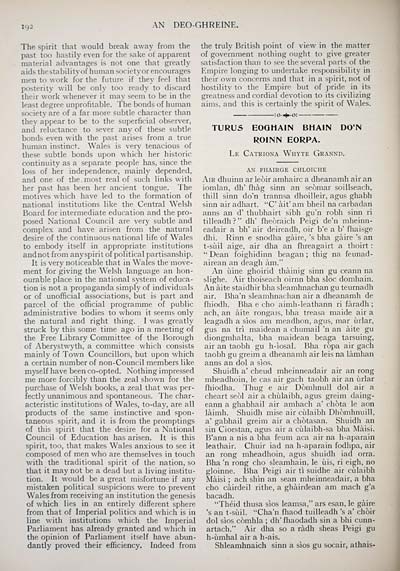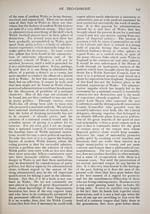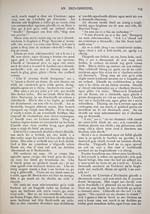Blair Collection > Deo-gréine
(214)
Download files
Complete book:
Individual page:
Thumbnail gallery: Grid view | List view

192
AN DEO-GHREINE.
The spirit that would break away from the
past too hastily even for the sake of apparent
material advantages is not one that greatly
aids thestabilityof human societyor encourages
men to work for the future if they feel that
posterity will be only too ready to discard
their work whenever it may seem to be in the
least degree unprofitable. The bonds of human
society are of a far more subtle character than
thev appear to be to the superficial observer,
and reluctance to sever any of these subtle
bonds even with the past arises from a true
human instinct. Wales is very tenacious of
these subtle bonds upon which her historic
continuity as a separate people has, since the
loss of her independence, mainly depended,
and one of the most real of such links with
her past has been her ancient tongue. The
motives which have led to the formation of
national institutions like the Central Welsh
Board for intermediate education and the pro-
posed National Council are very subtle and
complex and have arisen from the natural
desire of the continuous national life of Wales
to embody itself in appropriate institutions
andnot from anyspirit of political partisanship.
It is very noticeable that in Wales the move-
ment for giving the Welsh language an hon-
ourable place in the national system of educa-
tion is not a propaganda simply of individuals
or of unofficial associations, but is part and
parcel of the official programme of public
administrative bodies to whom it seems only
the natural and right thing. I was greatly
struck by this some time ago in a meeting of
the Free Library Committee of the Borough
of Aberystwyth, a committee which consists
mainly of Town Councillors, but upon which
a certain number of non-Council members like
myself have been co-opted. Nothing impressed
me more forcibly than the zeal shown for the
purchase of Welsh books, a zeal that was per-
fectly unanimous and spontaneous. The char-
acteristic institutions of Wales, to-day, are all
products of the same instinctive and spon-
taneous spirit, and it is from the promptings
of this spirit that the desire for a National
Council of Education has arisen. It is this
spirit, too, that makes Wales anxious to see it
composed of men who are themselves in touch
with the traditional spirit of the nation, so
that it may not be a dead but a living institu-
tion. It would be a great misfortune if any
mistaken political suspicions were to prevent
Wales from receiving an institution the genesis
of which lies in an entirely different sphere
from that of Imperial politics and which is in
line with institutions which the Imperial
Parliament has already granted and which in
the opinion of Parliament itself have abun-
dantly proved their efficiency. Indeed from
the truly British point of view in the matter
of government nothing ought to give greater
satisfaction than to see the several parts of the
Empire longing to undertake responsibility in
their own concerns and that in a spirit, not of
hostility to the Empire but of pride in its
greatness and cordial devotion to its civilizing
aims, and this is certainly the spirit of Wales.
TURUS EOGHAIN BHAIN DO'N
ROINN EORPA.
Le Catriona Whyte Grannd.
AN FHAIRGE CHLOICHE
Air dhuinn ar leòir amhairc a dheanamh air an
iomlan, dh' fhàg sinn an seòmar soillseach,
thill sinn do'n trannsa dhoilleir, agus ghabh
sinn air adhart. "C' àit' am bheil na carbadan
anns an d' thubhairt sibh gu'n robh sinn ri
tilleadh ? " dh' fheòraich Peigi de'n mheinn-
eadair a bh' air deireadh, oir b'e a b' fhaisge
dhi. Rinn e snodha gàire, 's bha gàire 's an
t-sùil aige, air dha an fhreagairt a thoirt :
" Dean foighidinn beagan ; thig na feunad-
airean an deagh àm."
An ùine ghoirid thàinig sinn gu ceann na
slighe. Air thoiseach oirnn bha sloe domhain.
An àite staidhir bha sleamhnachan gu teurnadh
air. Bha'n sleamhnachan air a dheanamh de
fhiodh. Bha e cho aimh-leathann ri fàradh ;
ach, an aire rongais, bha treasa maide air a
leagadh a sios am meadhon, agus, mar ùrlar,
gus na tri maidean a chumail 'n an aire gu
diongmhalta, bha maidean beaga tarsuing,
air an taobh gu h-iosal. Bha ròpa air gach
taobh gu greim a dheanamh air leis na làmhan
anns an dol a sios.
Shuidh a' cheud mheinneadair air an rong
mheadhoin, le cas air gach taobh air an ùrlar
fhiodha. Thug e air Dòmhnull dol air a
cheart seòl air a chùlaibh, agus greim daing-
eann a ghabhail air amhach a' chòta le aon
làimh. Shuidh mise air cùlaibh Dhòmhnuill,
a' gabhail greim air a chòtasan. Shuidh an
sin Ciorstan, agus air a cùlaibh-sa bha Màisi.
B'ann a nis a bha feum aca air na h-aparain
leathair. Chuir iad na h-aparain fodhpa, air
an rong mheadhoin, agus shuidh iad orra.
Bha 'n rong cho sleamhain, le uis, ri eigh, no
gloinne. Bha Peigi air ti suidhe air cùlaibh
Màisi ; ach shin an sean mheinneadair, a bha
cho càirdeil rithe, a ghàirdean am mach g'a
bacadh.
"Thèid thusa sios leamsa," ars esan, le gàire
's an t-sùil. "Cha'n fhaod tuilleadh 's a' choir
dol sios còmhla ; dh' fhaodadh sin a bhi cunn-
artach." Air dha so a ràdh sheas Peigi gu
h-ùmhal air a h-ais.
Shleamhnaich sinn a sios gu socair, athais-
AN DEO-GHREINE.
The spirit that would break away from the
past too hastily even for the sake of apparent
material advantages is not one that greatly
aids thestabilityof human societyor encourages
men to work for the future if they feel that
posterity will be only too ready to discard
their work whenever it may seem to be in the
least degree unprofitable. The bonds of human
society are of a far more subtle character than
thev appear to be to the superficial observer,
and reluctance to sever any of these subtle
bonds even with the past arises from a true
human instinct. Wales is very tenacious of
these subtle bonds upon which her historic
continuity as a separate people has, since the
loss of her independence, mainly depended,
and one of the most real of such links with
her past has been her ancient tongue. The
motives which have led to the formation of
national institutions like the Central Welsh
Board for intermediate education and the pro-
posed National Council are very subtle and
complex and have arisen from the natural
desire of the continuous national life of Wales
to embody itself in appropriate institutions
andnot from anyspirit of political partisanship.
It is very noticeable that in Wales the move-
ment for giving the Welsh language an hon-
ourable place in the national system of educa-
tion is not a propaganda simply of individuals
or of unofficial associations, but is part and
parcel of the official programme of public
administrative bodies to whom it seems only
the natural and right thing. I was greatly
struck by this some time ago in a meeting of
the Free Library Committee of the Borough
of Aberystwyth, a committee which consists
mainly of Town Councillors, but upon which
a certain number of non-Council members like
myself have been co-opted. Nothing impressed
me more forcibly than the zeal shown for the
purchase of Welsh books, a zeal that was per-
fectly unanimous and spontaneous. The char-
acteristic institutions of Wales, to-day, are all
products of the same instinctive and spon-
taneous spirit, and it is from the promptings
of this spirit that the desire for a National
Council of Education has arisen. It is this
spirit, too, that makes Wales anxious to see it
composed of men who are themselves in touch
with the traditional spirit of the nation, so
that it may not be a dead but a living institu-
tion. It would be a great misfortune if any
mistaken political suspicions were to prevent
Wales from receiving an institution the genesis
of which lies in an entirely different sphere
from that of Imperial politics and which is in
line with institutions which the Imperial
Parliament has already granted and which in
the opinion of Parliament itself have abun-
dantly proved their efficiency. Indeed from
the truly British point of view in the matter
of government nothing ought to give greater
satisfaction than to see the several parts of the
Empire longing to undertake responsibility in
their own concerns and that in a spirit, not of
hostility to the Empire but of pride in its
greatness and cordial devotion to its civilizing
aims, and this is certainly the spirit of Wales.
TURUS EOGHAIN BHAIN DO'N
ROINN EORPA.
Le Catriona Whyte Grannd.
AN FHAIRGE CHLOICHE
Air dhuinn ar leòir amhairc a dheanamh air an
iomlan, dh' fhàg sinn an seòmar soillseach,
thill sinn do'n trannsa dhoilleir, agus ghabh
sinn air adhart. "C' àit' am bheil na carbadan
anns an d' thubhairt sibh gu'n robh sinn ri
tilleadh ? " dh' fheòraich Peigi de'n mheinn-
eadair a bh' air deireadh, oir b'e a b' fhaisge
dhi. Rinn e snodha gàire, 's bha gàire 's an
t-sùil aige, air dha an fhreagairt a thoirt :
" Dean foighidinn beagan ; thig na feunad-
airean an deagh àm."
An ùine ghoirid thàinig sinn gu ceann na
slighe. Air thoiseach oirnn bha sloe domhain.
An àite staidhir bha sleamhnachan gu teurnadh
air. Bha'n sleamhnachan air a dheanamh de
fhiodh. Bha e cho aimh-leathann ri fàradh ;
ach, an aire rongais, bha treasa maide air a
leagadh a sios am meadhon, agus, mar ùrlar,
gus na tri maidean a chumail 'n an aire gu
diongmhalta, bha maidean beaga tarsuing,
air an taobh gu h-iosal. Bha ròpa air gach
taobh gu greim a dheanamh air leis na làmhan
anns an dol a sios.
Shuidh a' cheud mheinneadair air an rong
mheadhoin, le cas air gach taobh air an ùrlar
fhiodha. Thug e air Dòmhnull dol air a
cheart seòl air a chùlaibh, agus greim daing-
eann a ghabhail air amhach a' chòta le aon
làimh. Shuidh mise air cùlaibh Dhòmhnuill,
a' gabhail greim air a chòtasan. Shuidh an
sin Ciorstan, agus air a cùlaibh-sa bha Màisi.
B'ann a nis a bha feum aca air na h-aparain
leathair. Chuir iad na h-aparain fodhpa, air
an rong mheadhoin, agus shuidh iad orra.
Bha 'n rong cho sleamhain, le uis, ri eigh, no
gloinne. Bha Peigi air ti suidhe air cùlaibh
Màisi ; ach shin an sean mheinneadair, a bha
cho càirdeil rithe, a ghàirdean am mach g'a
bacadh.
"Thèid thusa sios leamsa," ars esan, le gàire
's an t-sùil. "Cha'n fhaod tuilleadh 's a' choir
dol sios còmhla ; dh' fhaodadh sin a bhi cunn-
artach." Air dha so a ràdh sheas Peigi gu
h-ùmhal air a h-ais.
Shleamhnaich sinn a sios gu socair, athais-
Set display mode to: Large image | Transcription
Images and transcriptions on this page, including medium image downloads, may be used under the Creative Commons Attribution 4.0 International Licence unless otherwise stated. ![]()
| Early Gaelic Book Collections > Blair Collection > Deo-gréine > (214) |
|---|
| Permanent URL | https://digital.nls.uk/76700047 |
|---|
| Description | A selection of books from a collection of more than 500 titles, mostly on religious and literary topics. Also includes some material dealing with other Celtic languages and societies. Collection created towards the end of the 19th century by Lady Evelyn Stewart Murray. |
|---|
| Description | Selected items from five 'Special and Named Printed Collections'. Includes books in Gaelic and other Celtic languages, works about the Gaels, their languages, literature, culture and history. |
|---|

